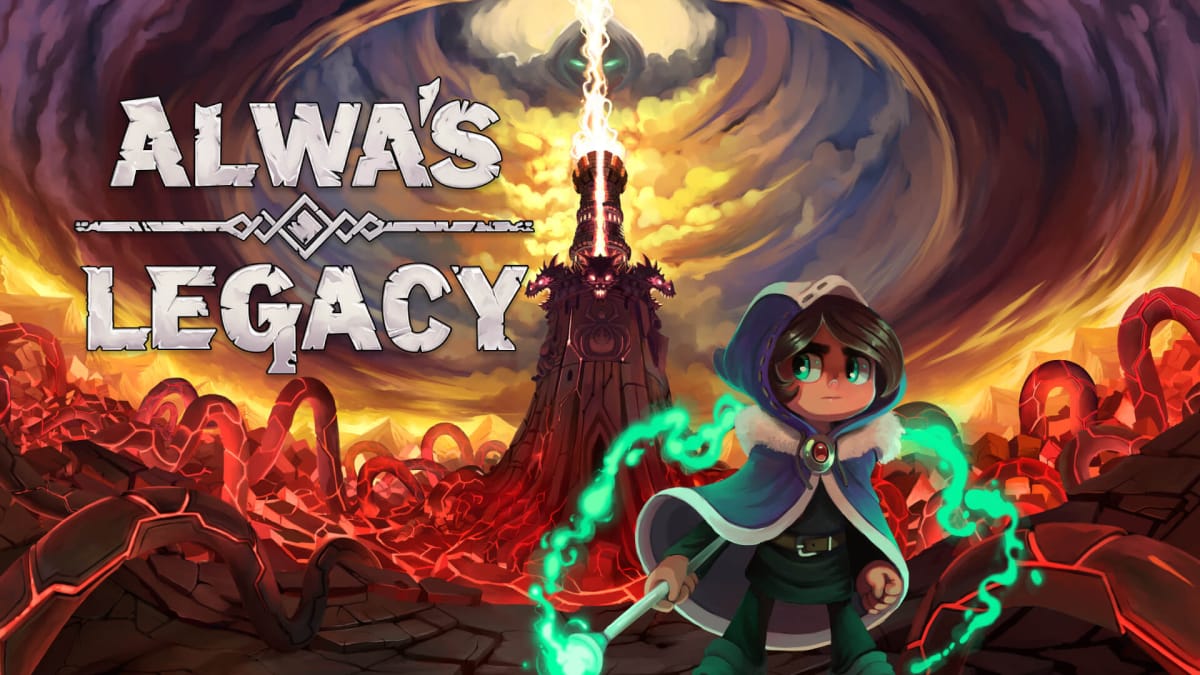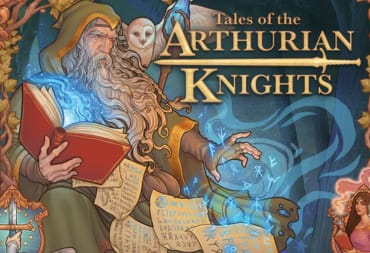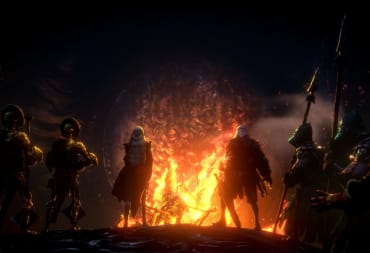Waking up on a strange beach, you struggle to recall any memory of who you are or why you’re here. An evil wizard steals your staff and a mysterious old sage in a library gives you a map. Sound familiar? That’s right, the narrative of Alwa’s Legacy is fairly typical fantasy fare. The game tasks protagonist Zoe with exploring the land of Alwa to recover your memory and get your revenge.
The opening scene is illustrative of a game that sticks fastidiously to the tried and tested. It makes for an enjoyable experience but one that doesn’t push the boat out enough to be truly memorable. The world, narrative and game mechanics are archetypal Metroidvania: you explore a well-constructed, interconnected world, unlocking new areas by picking up new items and gaining new abilities. Alwa consists of the usual landscapes to explore. Zoe traverses caves, mountains, catacombs, swamps and woods, battling enemies and helping NPCs along the way.
When I completed my journey through Alwa, I struggled to settle on an overall impression. Alwa’s Legacy has no blatant shortcomings: it’s a charming and nostalgia-inducing pixel-art adventure. It’s also a relatively competent Metroidvania that observes the genre’s popular tropes studiously. This is in many ways to its credit but, ultimately I think, its detriment as well. It’s a good game but not a great one. Again, I couldn’t help feeling it sticks to the formula a little too closely without recognising what makes Metroidvania games really sparkle.
Igarashi’s Legacy
I suppose that, even today, the term Metroidvania requires a little bit of unpacking. I’ll try to be brief. The word itself is a portmanteau of the two influential series Metroid and Castlevania. Games in this genre tend to be 2D platformers featuring a large, interconnected map the player can explore, the traversal of which is reliant on picking up items and upgrades along the way. The genre has undergone something of a renaissance in the ‘00s and particularly ‘10s as a darling of the indie development world. You don’t need a big budget to make a Metroidvania. However, you do need great world-building and game design finesse.
Koji Igarashi, Assistant Director for the incredibly influential Castlevania: Symphony of the Night, has become something of a poster boy for Metroidvania games. Other video game nerds might find the presentation he gave on what makes a good Metroidvania as interesting as I did. Considering Alwa’s Legacy is content to stick closely to the playbook, I thought I’d use the thoughts of the man who wrote that playbook, figuratively speaking, to see how it matches up.
The Illusion of Choice
You get free rein to wander around Alwa pretty much from the get-go but real progress is heavily gated by access to certain abilities. Igarashi suggests that Metroidvanias should give the illusion of free exploration of the map but actually guide the player through an intended route. I spent a lot of time in Alwa’s Legacy retreading my steps after picking up the requisite item which was hindering my progress. After a while, this formula became tedious. The items and abilities you needed were often difficult to find, with the game offering little in the way of clues. I’m slightly ashamed to admit that I had to consult the oracle of Google to find some obscurely cached items.
If you’re going to make a Metroidvania, you need careful game design to guide your player gently along the intended route. Alwa’s Legacy fails to do that, meaning several hours of wandering around aimlessly until you stumble on the requisite amulet or whatever else it is you need to progress. The fact that you can’t annotate the map is frustrating. I ended up taking a screenshot of the map and editing it on a laptop. I don’t really know how you’d remember where things were without that.
Thomas Mahler of Moon Studios, who developed Ori and the Blind Forest, said that “players remembering the levels is part of the core design” of Metroidvanias. Again, Alwa’s Legacy’s reliance on traditional fantasy narratives means this is difficult. I found myself struggling to recall which place was which when I needed to retrace my steps. Beyond the impressive pixel-art style, the different areas have little that make them stand out.
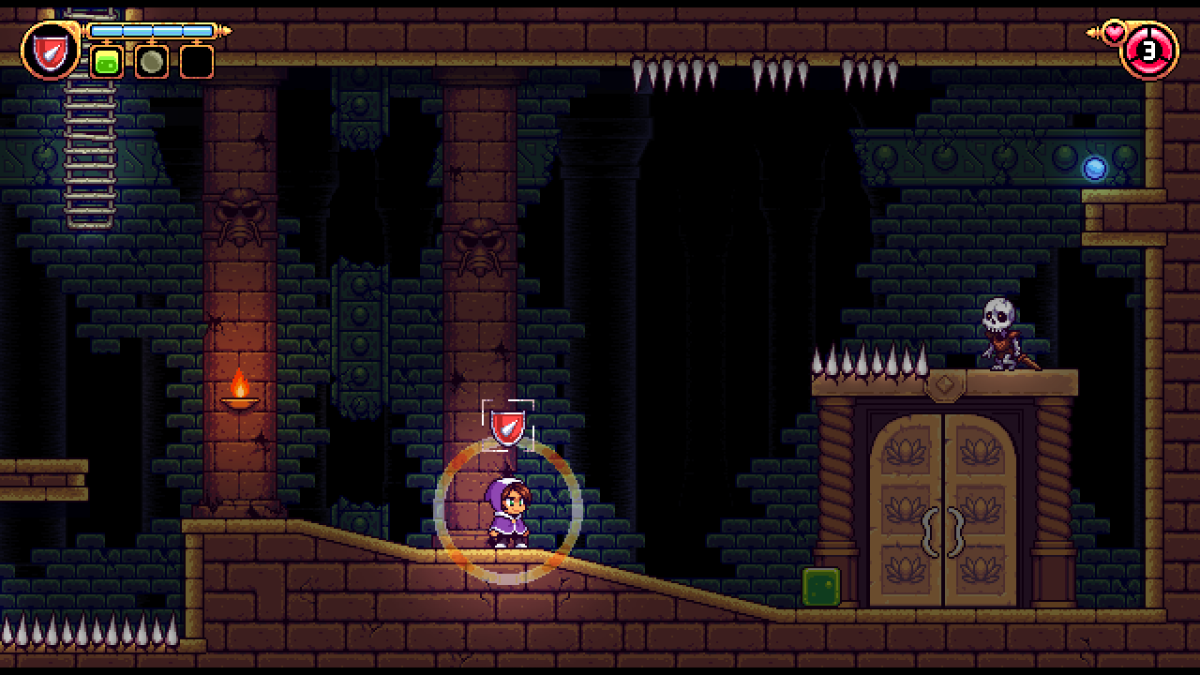
Destined To Forget
As a sequel to Alwa’s Awakening, a game I didn’t play, I’m assuming the unfolding plot has some relevance to previous events. Personally, I struggled to really get invested in Zoe’s story. She doesn't have much personality and you don't learn a great deal about her as you go along. Perhaps those of you who played Alwa's Awakening will get more out of it than I did. It's not that the plot and characterisation of Alwa's Legacy is bad, it's just a bit barebones for my liking.
Igarashi notes that building a personal connection with the protagonist is a key part of making the game work. In that regard, it's a shame that you don't learn more about Zoe during your quest. The same goes for the rest of the cast. I’d often discover a strange character in a far-flung part of Alwa and be disappointed when they failed to utter more than a couple of lines of dialogue. Some of the characters you encounter, like Saga, the mysterious old woman, seem interesting but you never get to find out enough about them to get truly invested.
Saga in particular seems like an integral part of the plot but whenever I visited her outside of the main plot points, she just gave me the same line of dialogue about looking at my map if I was stuck. There are some rewarding encounters with NPCs but I'd like them to have more depth. Similarly, the dialogue is often great: I just want more of it. The game would benefit from more NPC questlines to allow its knowing, witty writing style to really shine.
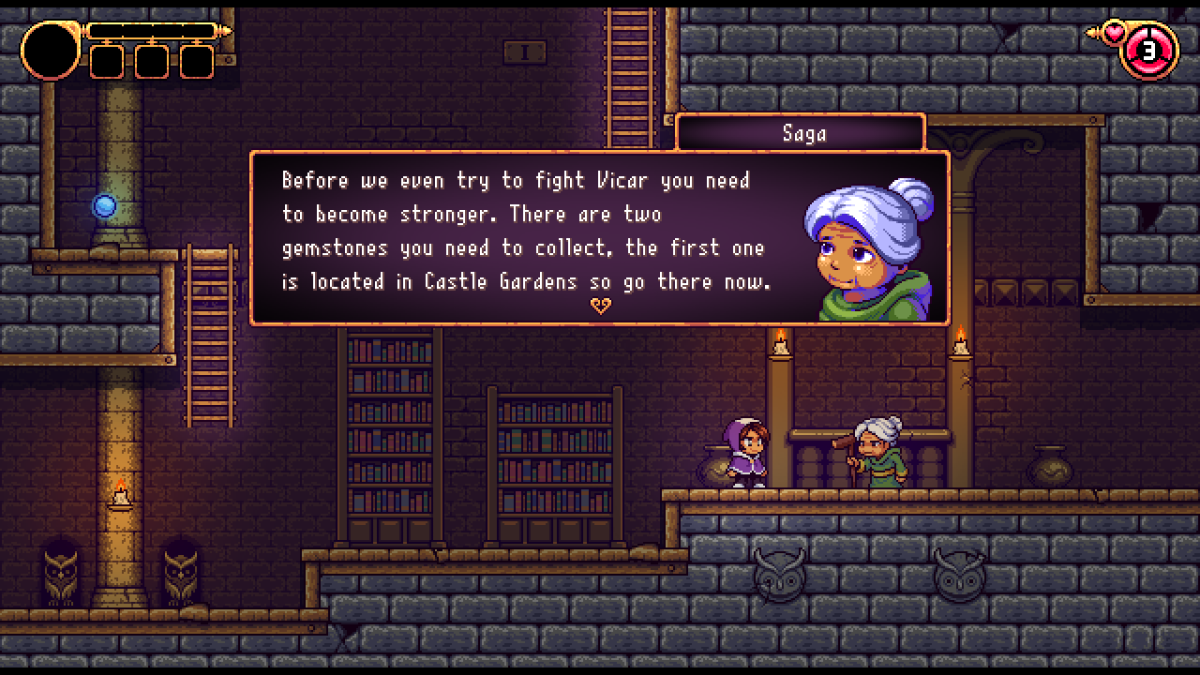
Retroidvania
Alwa’s Legacy is a clear evocation of a certain era of gaming. I think that’s something it actually does really well. The pixel-art style is gorgeous and colourful. The sweeping plains and mountains around Boyd’s Farm are particularly striking. Without giving anything away, the final dungeon of the game is as dramatic and exciting as you’d hope. The 16-bit-inspired soundtrack, although a bit repetitive at points, is well-placed and complements the pixel-art nicely, as well.
I played Alwa’s Legacy on the Switch, where it felt completely at home. Fighting through each dungeon and exploring the world while lying in bed in handheld mode was a real burst of nostalgia. The load times were a bit longer than you’d hope, given the simplicity of the game, but other than that it performed fine and suited the platform.
The combat and platforming also bring to mind classic 2D platformers from the '90s. The game seems simple at first but making your way through Alwa can be tricky. Patience is key to overcoming most obstacles. You never get a giant fireball that obliterates all in your path, for example. The enemies and traps are predictable: you've just got to carefully plan your way through each room. A big part of that will be making sure you're utilising your arsenal of spells and items appropriately. Selecting the right combination of spells to manoeuvre through a particularly tough room is very rewarding.
This assortment of weapons and abilities is probably what Alwa's Legacy does best. It's no coincidence that it's also where it strays from the established norm. Games like this usually give you a double jump or the ability to climb walls so you can access new areas. The equivalent in Alwa's Legacy is learning to conjure a small bubble which you can jump on as it rises. This allows for fresh and innovative interactions with your environment and working out the various applications of each spell was satisfying. You can upgrade your spells as well, allowing you to focus more on exploration or combat as you prefer. I would have liked a bit more variation in enemies and traps but the combat is definitely the area where Alwa's Legacy impressed me most.
Alwa's Legacy Review | Final Thoughts
On the surface, Alwa’s Legacy is a real box-ticker. Developer Elden Pixels clearly knows what makes these games so popular and enduring. The art style is great and the combat is nuanced and rewarding. Having said that, the game lacks the innovation and freshness that sets latter day classics like Hollow Knight and Axiom Verge apart. It pains me to say it considering I quite enjoyed the game but, ultimately, Alwa’s Legacy is disappointingly forgettable. Its reluctance to explore the genre’s boundaries holds it back and some of the games stronger suits, like dialogue, are too fleeting to really shine. It's important to note that the tropes Elden Pixels slavishly adheres to have lasted this long for a reason. They make Alwa's Legacy a satisfying, entertaining game but one that, like Zoe’s past, doesn’t linger long in the memory.
TechRaptor reviewed Alwa's Legacy on Nintendo Switch with a code provided by the publisher. It is also available on PlayStation 4, Xbox One, and PC.
Review Summary
Pros
- Looks Gorgeous
- Memorable Soundtrack
- A Nostalgic Adventure That Evokes A Bygone Era Of Gaming Well
Cons
- Struggles To Stand Out From The Metroidvania Crowd
- Forgettable Story And Characters
- Needs More Structure To Guide The Player Through The Game
Have a tip, or want to point out something we missed? Leave a Comment or e-mail us at tips@techraptor.net
